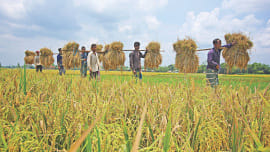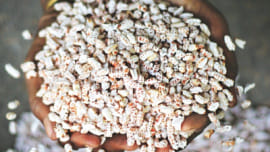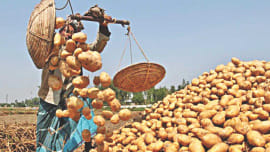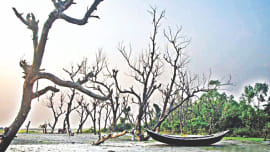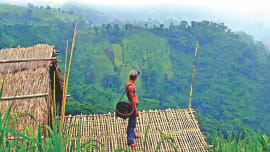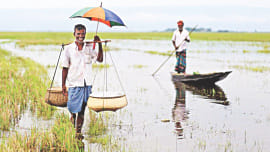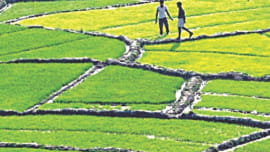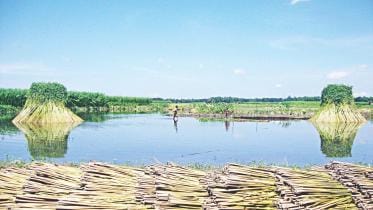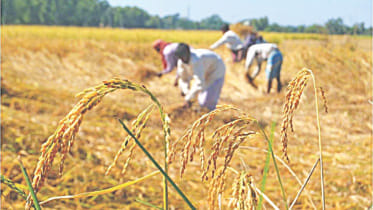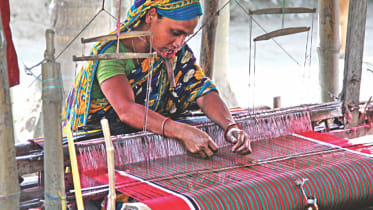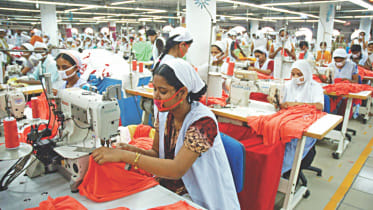Silver jubilee special / Nutritional security through bio-fortified zinc rice
3 February 2016, 18:00 PM
25th anniversary special part-4
Silver jubilee special / The dark horse, not the black sheep
3 February 2016, 18:00 PM
25th anniversary special part-4
Editor's Note
3 February 2016, 18:00 PM
25th anniversary special part-4
Silver jubilee special / Food security prospects
3 February 2016, 18:00 PM
25th anniversary special part-4
Political economy of climate finance
3 February 2016, 18:00 PM
25th anniversary special part-4
Silver jubilee special / Addressing poverty, inequality and climate change
3 February 2016, 18:00 PM
25th anniversary special part-4
Inclusive growth and climate resilient development
3 February 2016, 18:00 PM
25th anniversary special part-4
Farming in the days of climate change
3 February 2016, 18:00 PM
25th anniversary special part-4
The implications of Paris agreement for Bangladesh
3 February 2016, 18:00 PM
25th anniversary special part-4
The keys to unlocking production potentials of the coastal zone
3 February 2016, 18:00 PM
25th anniversary special part-4
Nutritional security through bio-fortified zinc rice
Bangladesh agriculture has contributed to achieving food self sufficiency through production of about 38 million tons of food grain.
3 February 2016, 18:00 PM
The dark horse, not the black sheep
Sustainable development goal 2, is a call to action for leaders in agriculture. As a green nation, Bangladesh has no reason, or excuse,
3 February 2016, 18:00 PM
Editor's Note
This is the fourth instalment of The Daily Star's silver jubilee special supplements themed On High Road to Progress. This part, titled, Climate, Women and Sustainable Development, contains articles under the following sub-sections: Climate and Agriculture; Women; and Sustainable Development.
3 February 2016, 18:00 PM
Food security prospects
Bangladesh has made substantial progress in enhancing food security by increasing production of food grains, particularly rice and by
3 February 2016, 18:00 PM
Political economy of climate finance
As the implications of the Paris Agreement on Climate Change of 2015 become clear, financing of actions to tackle climate change on both the global and national level in every country will play a key role. These will, in turn, be influenced largely by the global and national political economy. In this article, I will try to give some personal insight on the matter of the political economy in which future climate change finance is likely to play out. This will include the main institutions involved, main drivers of change and where things are going.
3 February 2016, 18:00 PM
Addressing poverty, inequality and climate change
The outcome document of Rio+20 conference held in Rio de Janeiro, Brazil in June 2012, 20 years after the Earth Summit was held
3 February 2016, 18:00 PM
Inclusive growth and climate resilient development
Emerging sustainable development and Bangladesh: From the mid-1980s, the concept of sustainable development has dominated the global and national development discourse. Sustainable development for Bangladesh or similar poor and rapidly transforming societies can be defined as rapid economic growth, which is environmentally sound and socially just, focusing on poverty reduction. 2015 saw the culmination of three interacting and reinforcing global processes including the emergence of the Sustainable Development Goals (SDGs), the Sendai Framework for Disaster Risk Reduction and the Paris Agreement on Climate Change.
3 February 2016, 18:00 PM
Farming in the days of climate change
Climate change is a reality and so is the farming sector's resilience to it in Bangladesh.
3 February 2016, 18:00 PM
The implications of Paris agreement for Bangladesh
A lot has already been written and stated about the Paris Agreement on Climate Change, but little about how san LDC such as Bangladesh may benefit from it.
3 February 2016, 18:00 PM
The keys to unlocking production potentials of the coastal zone
The coastal zone of Bangladesh is the most vulnerable region of the Ganges basin. Occupying about 30% of the country's land area, it is home to the world's poorest and most food-insecure people, whose livelihoods primarily depend on agriculture and aquaculture. It comprises of low lying lands with a dense
3 February 2016, 18:00 PM
Structural transformation of agriculture
One of the dominant aspects of the Bangladeshi economy is its structural change featuring a declining share of agriculture in GDP over the last four decades.
3 February 2016, 18:00 PM
Water management for agricultural development
In the context of the changing global environment and socio-political and economic conditions of Bangladesh, agricultural development of the country and its sustainability deserve active government-private partnership. A comprehensive agricultural development action plan is required to face the challenges of feeding growing population.
3 February 2016, 18:00 PM
Transforming rice breeding
Rice is more than just a food source to us. It is part of our culture, an article of trade to reduce hunger, alleviate poverty and maintain political stability in Bangladesh. Rice covers most of our land almost thorough out the year. We get the lion's share of our daily calorie intake from rice.
3 February 2016, 18:00 PM
Women's work: Unrecognised and undervalued
Conventionally, work is defined as any activity undertaken in lieu of remuneration. The value of work is determined by the level of remuneration. Therefore, any work undertaken without remuneration is considered non-valuable and non-work. On the other hand,any work done outside, such as office, factory, fieldis considered more valuable then work done at home. The conclusion therefore is, men work outside, get remuneration so their work is valuable. Women work at home, get no remuneration, therefore their work is considered non-work having no or little value.
3 February 2016, 18:00 PM
Emerging women SME entrepreneurs
It is heartening to note that despite many barriers, a new women's entrepreneur class in the Small and Medium sector has developed in the country taking on the challenge to work in a male-dominated, competitive and complex economic and business environment. It has been found that at present women entrepreneurs
3 February 2016, 18:00 PM
Liberty and equality in education, health and wealth
Marie Antoinette famously asked the French poor to “eat cake” if bread was not available. Social disparities leading to a famine caused by rising bread prices, had hit the poor poorly. On 5th October 1789 women, unable to feed their families and outraged by the chronic shortage of bread, converged in the market place of Paris
3 February 2016, 18:00 PM
Women's economic empowerment to reduce violence
Although women constitute half of Bangladesh's population of approximately 160 million, unfortunately they are not as empowered as their male counterparts.
3 February 2016, 18:00 PM
Food security: It's not only about production
Food security exists when all people, at all times, have access to sufficient, safe and nutritious food to maintain healthy and
3 February 2016, 18:00 PM



